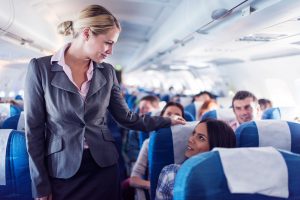- About Ramapo
- Academics
- Admissions & Aid
- Student Life
- Athletics
- Alumni
- Arts & Community
- Quick Links
- Apply
- Visit
- Give
Ramapo College Articles
The Not-So-Friendly Skies

By now most everyone has seen the video of a 69-year-old man being dragged from his United flight by terminal police officers – the result of an overbooked flight and an algorithm that selected his seat number. Can you think of any other industry that treats law abiding and non-threatening customers the same way? Imagine the furor if, say, Macy’s summoned mall security to retrieve a previously purchased garment from a customer and then proceeded to drag them out of the store because a Macy’s employee wanted the same size.
United’s CEO was quick to apologize and promised to investigate the ordeal. But in a memo to employees immediately after the news broke, he commended the crew for following established procedures when dealing with “situations like this.” No such commendation was offered to the aviation security officer that dragged the passenger through the aisle – he was suspended from his position pending further review. Who was it then that acted inappropriately?
United’s multiple attempts at an apology were too little and too late to stem the public outrage over the incident. The U.S. Department of Transportation is now investigating the incident.
United, in need of four additional seats, reportedly offered up to a thousand dollars in compensation but found only found three willing sellers. My guess is that when the compensation policy was first established that amount was more than enough to arrive at the desired outcome. But surely the cost of the current brouhaha is going to cost United thousands of dollars more in damage to its reputation, lost business, potential legal bills, as well as the cost of the passenger’s medical bills. I have no doubt that plenty of passengers on that Chicago flight would have gladly sold their seats at prices well in excess of a thousand dollars had it been offered.
Stop and think how you might have reacted under those same circumstances. If you were a passenger, would you have offered your seat to prevent the injustice? Forgetting about the legal merits of the overbooking policy, when does human decency come into play? Should employees be required to check their judgment, instincts and morals at the door when they enter their place of work each day? Didn’t we learn that the financial crisis was a tale of countless individuals dutifully following the rules, knowing full well that it did not pass the smell test?
It’s hard to imagine running an airline or any business without rules. And quite often, the rules work pretty well. But the world doesn’t always fit neatly into our preset designs. When things go awry, we rely on individuals to exercise their skills and to make a split-second decision based on experience and judgment. We need to look no further than the Miracle on the Hudson to underscore the importance of exercising good judgment. Though most of us will never know the magnitude of that drama, we are no less responsible for the countless decisions we make each day and the actions we take, regardless of what our employer’s policies dictate.
The irony is that management had a simple and fair alternative that could have been easily implemented – a spontaneous secondary market for airline seats where the price rises until enough passengers offer to “sell” their seats back to the airline. Each passenger would be free to make their own economic decision and all of the sellers would receive the same price.
How high should the airline pay to make room for the United crewmembers heading to staff a flight in Louisville? Whatever it takes to avoid what actually occurred. A more economically sound answer is the cost should rise until it’s equal to the cost of canceling the flight in Louisville. All else being equal, at some price – likely quite high – the airline should be indifferent between the cost of canceling the flight in Louisville and the cost of buying four passenger seats in Chicago.
Categories: MBA
Copyright ©2024 Ramapo College Of New Jersey. Statements And Policies. Contact Webmaster.

Follow Ramapo